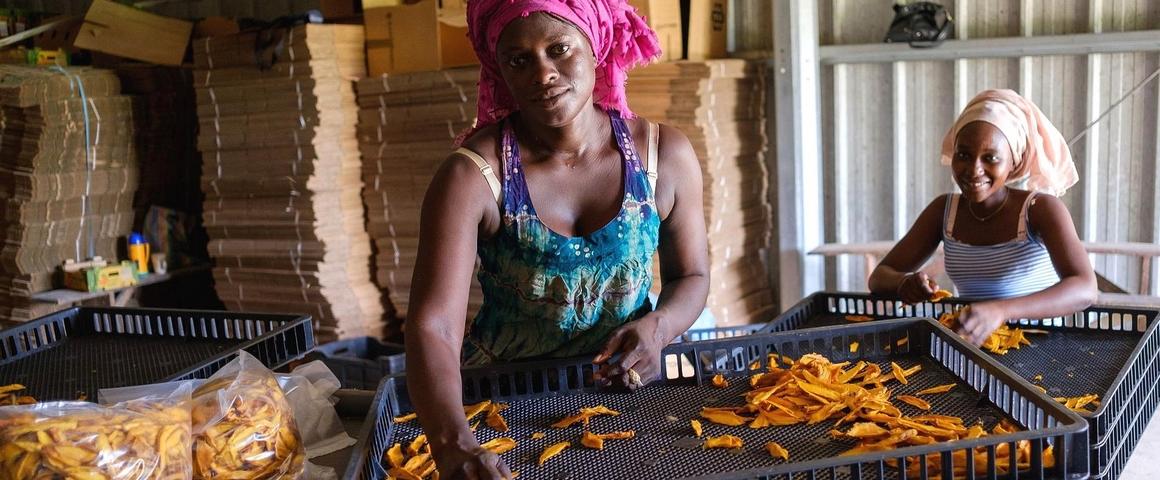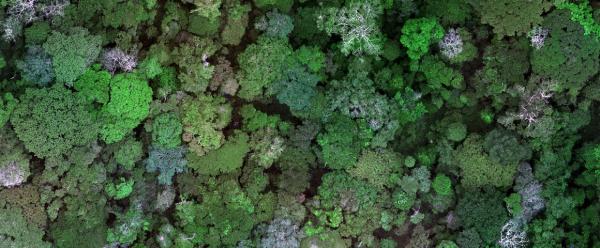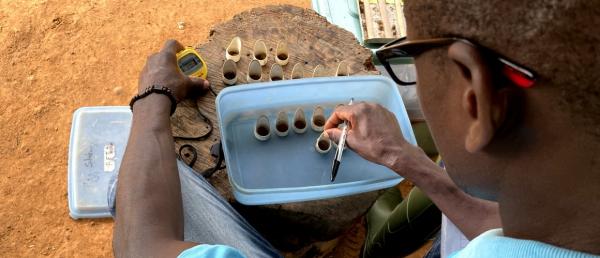Results & impact 23 April 2024
- Home
- CIRAD news
- News
- Biofuel from agrifood waste? A gamble that is paying off in Burkina Faso
Biofuel from agrifood waste? A gamble that is paying off in Burkina Faso

Workers at a small-scale dried mango firm in Burkina Faso © A. Chapuis, CIRAD
Access to energy is a complex issue for many firms in rural parts of West Africa. Joël Blin, a CIRAD researcher specializing in chemistry applied to bioenergy processes, is coordinator of the BioStar project, which is working to develop sustainable bioenergy solutions for small agrifood enterprises in rural parts of Senegal and Burkina Faso. "Our aim is to offer technical innovations that use agrifood waste for short-circuit energy production, be it heat, drive force or electricity. Those solutions are designed to be adapted to the requirements and constraints of the firms with which we are working".
Sixteen SMEs in Burkina Faso and Senegal are involved in the project, as pilot enterprises. In July, the first bioenergy equipment was installed at AgroBurkina, which produces dried mangoes. AgroBurkina is convinced of the technology's merits, and is already planning to install another, larger-capacity bioenergy-fuelled dryer made by local manufacturers. Identical equipment is also due to be produced locally and installed at three other pilot mango drying units in Burkina Faso and Senegal.
Replacing fossil fuels with renewable biomass
"Access to energy and the cost of it are major obstacles to our firm's development", says Samuel Doamba, Managing Director of AgroBurkina. "We need between 300 and 400 bottles of gas every day to dry mangoes, and energy costs eat up more than 60% of our turnover. The BioStar project is allowing us to innovate rapidly in this respect, while offering the right conditions for the long-term development of a real bioenergy sector in our country, by bringing large numbers of stakeholders together, particularly local equipment manufacturers."
Laurent Van de Steene is a specialist in bioenergy production processes from biomass with CIRAD's BioWooEB (Biomass, Wood, Energy, Bioproducts) research unit. Through the BioStar project, he has participated in developing a prototype furnace that burns cashew nut shells to produce heat for drying mangoes. Large volumes of waste cashew nut shells are available in the Bobo-Dioulasso region, in Burkina Faso. "Cashew nut processing firms discard large volumes of shells, which are seen as a pollutant. However, their high energy content makes them a great candidate for bioenergy production."
Nevertheless, burning shells to produce energy often generates a lot of smoke. The team therefore decided to work towards a less polluting solution. The work was done at the BioWooEB energy platform in Montpellier, in collaboration with Burkinabe and Senegalese scientific partners in Ouagadougou, Bobo Dioulasso and Saint Louis. The partnership led to the construction of a furnace capable of burning cashew nut shells to produce hot water that subsequently fuels a mango dryer. "The furnace uses 100% cashew nut shells. Combustion is both stable and clean, in other words produces very little ash and no smoke", Laurent Van de Steene is delighted to say. "As for the dryer, drying time is shorter than with gas-fired dryers and the dried mangoes produced are better quality."
The switch to heat produced using bioenergy rather than by burning fossil gas meant adapting the dryers. This was done at the QUALISUD research unit's agrifood technology platform, in collaboration with the scientific partners.
More about the BioStar project:
Equipment successfully designed and installed thanks to beneficiaries and partners
While the equipment was developed in Montpellier, France, it was the result of many ongoing exchanges between CIRAD and grass-roots players: AgroBurkina, local equipment manufacturers and research and training organizations in Burkina Faso ( International Institute for Water and Environmental Engineering - 2iE, Thomas Sankara University - UTS, and the Institut de Recherche en sciences appliquées et technologies - IRSAT). The furnace and dryer were shipped and installed at AgroBurkina in Bobo-Dioulasso by local partners.
A team of scientists from the BioStar project then tested the equipment and demonstrated it to staff at the SME and equipment manufacturers in the region. Laurent Van de Steene is clearly very pleased with the results: "Researchers are always a bit apprehensive when technology leaves their laboratory for field testing. In this case, it has been a complete success in technical terms, largely thanks to our local partners and to AgroBurkina". Samuel Doamba echoes this sentiment, and sees BioStar's participatory approach as "a guarantee of appropriate solutions and innovations, of their impact and of their sustainability. BioStar is a long-term solution", he says with a smile.
"If we want to have an impact and put our research into practice, we have to satisfy end users' requirements and work with them to build and test solutions", says Franck Lecoq, who is in charge of the BioStar project at CIRAD. This is confirmed by Magloire Sacla Aïde, who heads energy projects at the NGO Nitidae: "I see one of the BioStar project's strong points as its ability to federate researchers, NGOs, SMEs and equipment manufacturers and encourage them to introduce innovative solutions, in response to the realities on the ground". Nitidae is a partner in the BioStar project, and is keen to provide agrifood firms with technical expertise, to improve the performance of agricultural value chains while reducing their environmental impact and fostering local economic growth, hand in hand with producers' organizations.
Maintenance and local production of future equipment
Over a fortnight-long mission, the researchers carried out tests with AgroBurkina staff and local builders and equipment manufacturers, to familiarize them with the equipment. The participants were very enthusiastic about the technology, which is cleaner, uses less energy and produces top-quality dried mangoes. The equipment has been fully taken on board and is now in use at AgroBurkina without any outside assistance, while new, larger equipment is being developed.
Following this success, a similar dryer is due to be installed at another firm in Burkina Faso, the Paoline association. AgroBurkina has asked for equipment twice the size for the next mango processing season. Identical work is also due to be done at SMEs in Senegal. These new installations will hopefully be made entirely locally.
"For the time being, our technological gamble is paying off", says Joël Blin. "The aim now is to confirm the equipment's economic viability, which will depend on local manufacturing costs. We also need to make sure that it will be y for SMEs to maintain." Burkina Faso can count on a strong network of equipment manufacturers and builders for this.
The BioStar project, coordinated by CIRAD and funded by the European Union and the Agence Française de Développement under the DeSIRA programme, involves:
- Five national research and teaching organizations in West Africa (2iE, IRSAT, Thomas Sankara University, ISRA/Bame, Gaston Berger University)
- Three European research organizations (Catholic University of Louvain, University of Hohenheim Agricultural Engineering Institute, University of Rome III)
- One NGO (Nitidae)
Listen to the Nourrir le vivant podcast on BioStar's work (in French)


























_c.chabrier.jpg)
